Following up on yesterday’s revelations, our ongoing investigation into FBA Brand Builder’s (FBABB) trademark practices has uncovered even more troubling patterns of fraudulent filings, misuse of attorney names, and vague reassurances from their team. This article builds on the evidence, underscores the escalating risks to FBABB clients, and highlights the urgent need for immediate action to avoid severe legal and financial fallout.
If you’re an FBABB client who paid for a U.S. trademark filing, you need to take control of your application now. The USPTO has launched an ongoing investigation into Maria's fraudulent filings and scams linked to these cases. Waiting for FBABB’s promised January updates could harm your business. You need to act now-yes, right now.
What We’ve Uncovered
Our investigation into trademark filings submitted by or linked to FBABB has uncovered deeply concerning patterns, including:
1. Misuse of Attorney Names
Several trademark filings list unverified attorneys, including Maria Zafar, Waqas Ahmad, Victoria Velazquez Walker, Caitlin Jean Campbell, and Nyall Engfield.
- Nyall Engfield: This legitimate attorney confirmed that his name was used without consent. He stated: “It looks like another attorney tried to file a change of attorney at one point, with that bogus-looking email. I'll bring it to the USPTO's notice and also want to stop any fraudulent behavior.”
- Joe Costello: A legitimate attorney based in Plantation, Florida, yet filings list him at an unrelated address in Fort Lauderdale.

On the left, a trademark application lists Joe Costello as the attorney of record but uses Maria Zafar’s email and an incorrect address for his office. On the right is the legitimate address and contact details for Costello Law, as displayed on his official website.
- Caitlin Jean Campbell: Filings use the address of a federal courthouse in Santa Ana, California—an address with no connection to any attorney.
And as for Caitlin—she has confirmed this is a scam. So, who do you trust here: Jason, desperately trying to protect himself, or a registered attorney with the credentials to back her up?
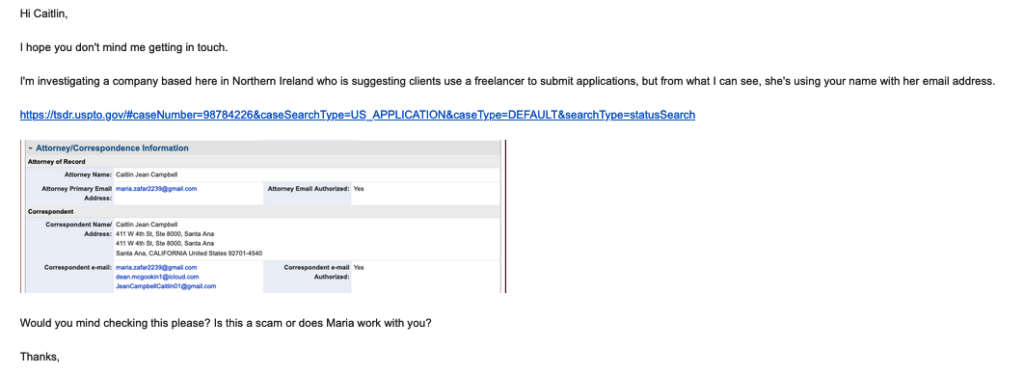
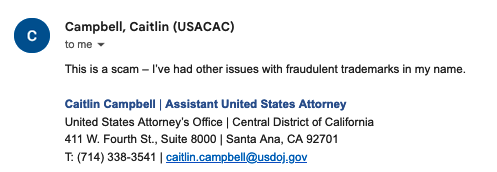
2. Use of Suspicious Addresses
Trademark applications are linked to questionable addresses, such as:
- 1 W Las Olas Blvd, Suite 600, Fort Lauderdale, FL
- 492 Wood Ridge Ave, NJ
- 411 West 4th Street, Room 1053 Santa Ana, CA
Investigations reveal these are either residential properties or locations with no ties to any legitimate legal practice.
3. Generic and Misleading Emails
Trademark filings consistently list unprofessional and generic emails, such as:
- [email protected] (freelancer)
- [email protected] (FBABB team)
These troubling findings highlight a pattern of misrepresentation and fraudulent activity that could have serious consequences for affected clients.
FBABB’s Troubling Response
Rather than tackling these serious issues directly, FBABB’s team has offered vague reassurances in community posts, including statements from Jason McKay such as:
- “Even in the worst-case scenario, if trademarks were ever filed incorrectly, it will NOT impact your ability to sell on Amazon. If needed, we would simply refile the trademarks at no cost to you.”
- “This is just another example of people trying to pull us down… We’ve built this community on honesty, hard work, and results.”
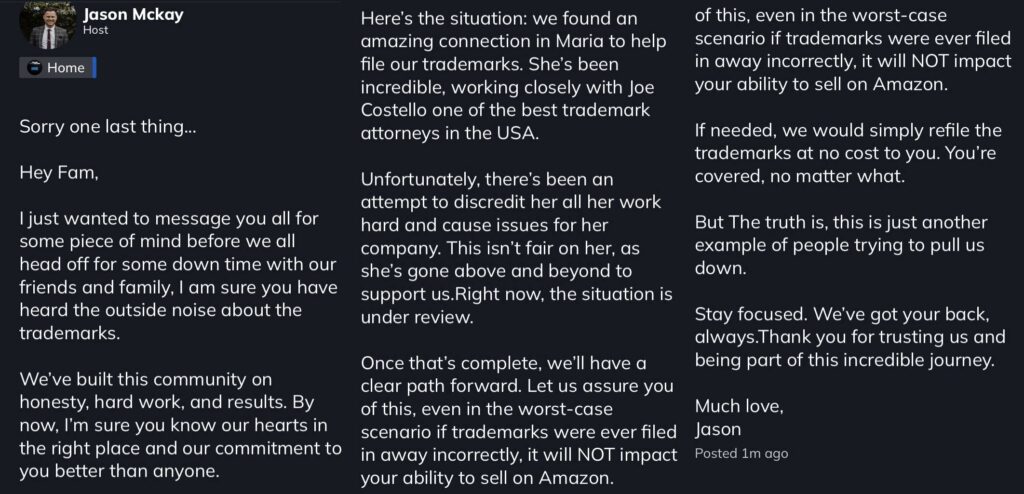
Jason McKay’s message downplays the severity of the trademark issues, offering vague reassurances instead of real solutions. What he isn’t telling you is that invalid trademarks can lead to Amazon suspensions, legal risks, and financial losses—issues that won’t wait until January. Protect your business now by verifying your trademarks and acting immediately.
Additionally, his claim about Maria being unfairly discredited ignores the fact that she is not a licensed attorney and cannot legally be listed as the attorney of record on trademark filings. Even if she were working with a legitimate attorney like Joe Costello (she's not - we asked him), the USPTO requires that only licensed attorneys represent clients in trademark matters. Misrepresenting her as an attorney deepens the fraud concerns and highlights the systemic nature of these violations.
Why You Should Be Concerned
- Minimising the Issue: Incorrect filings can lead to trademarks being invalidated or cancelled, exposing clients to competitors and legal disputes.
- Misleading Claims: Contrary to Jason’s assurances, Amazon may suspend product listings if trademarks are invalidated, which could disrupt sales and hurt businesses.
- Delays and Risks: Simply refiling doesn’t undo the damage. Fraudulent filings create delays, attract scrutiny, and leave clients to deal with the fallout, including potential additional costs.
FBABB’s failure to confront these issues transparently only exacerbates the risks for their clients, who deserve clear answers and immediate action.
Why This Matters: Risks to Your Business
If your trademark application was filed incorrectly or fraudulently, the potential consequences go far beyond the filing itself. Here’s what’s at stake:
1. Amazon Listing Suspensions
Amazon’s Brand Registry requires valid trademarks to maintain protection. If your filing is flagged or cancelled by the USPTO, you could lose access to these protections, leaving your business vulnerable to counterfeiters and listing hijackers. Suspension of your listings could severely impact your sales and customer trust.
2. Financial Costs
Fixing fraudulent filings isn’t cheap. You’ll need to hire a legitimate trademark attorney, pay for reapplication fees, and potentially deal with legal challenges. Delays in securing trademark approval can leave your brand exposed to risks, harming your ability to safeguard your intellectual property and potentially costing you revenue and market credibility.
3. Legal and Reputational Damage
Fraudulent filings can lead to investigations into your business by regulators, opening the door to heightened scrutiny and even lawsuits. The reputational damage alone could undermine your brand’s standing in the marketplace.
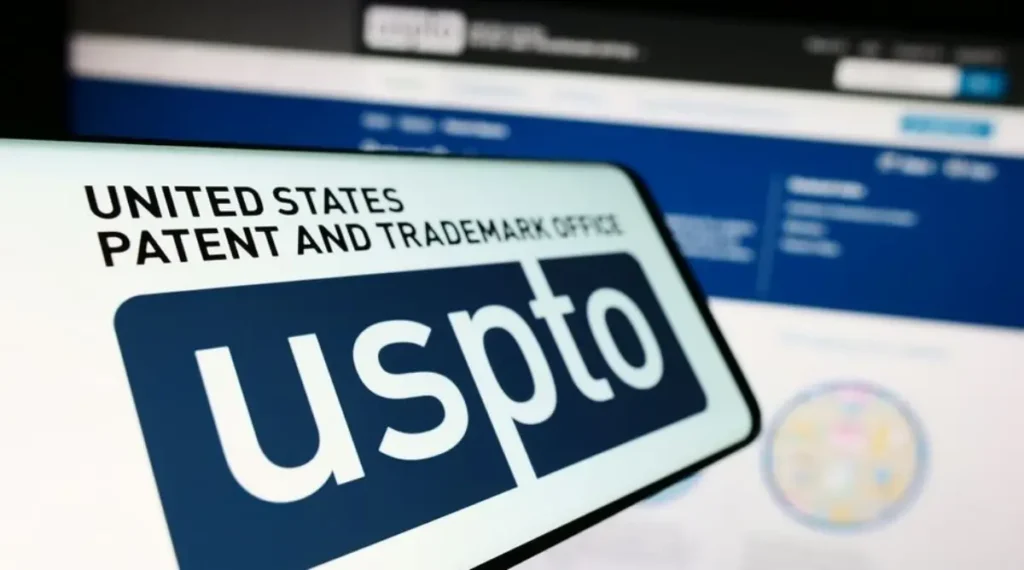
What You Must Do Now
FBABB’s vague promises to “refile at no cost” fail to address the urgency of this situation. Protect your business by taking these steps immediately:
Step 1: Verify Your Filing
Check your trademark application using the USPTO’s TSDR system. Pay close attention to:
- Red flags, such as unverified attorney names or suspicious addresses.
- Emails like [email protected] or [email protected] that undermine the legitimacy of the filing.
Step 2: Contact the USPTO Fraud Team
Email [email protected] with details of your application and any concerns. Include supporting documentation, such as invoices or correspondence from FBABB, to strengthen your case.
Step 3: Consult a Legitimate U.S. Attorney
Hire a licensed trademark attorney to evaluate your application and recommend corrective actions. This is the best way to ensure you regain full control of your intellectual property.
Step 4: Monitor Your Amazon Listings
Keep a close watch on your Brand Registry status and product listings. If Amazon flags any compliance issues, act swiftly to address them and maintain your marketplace presence.
Taking these steps now can save you from costly delays, legal challenges, and potential damage to your business. Don’t wait—act today to safeguard your trademarks and your brand.
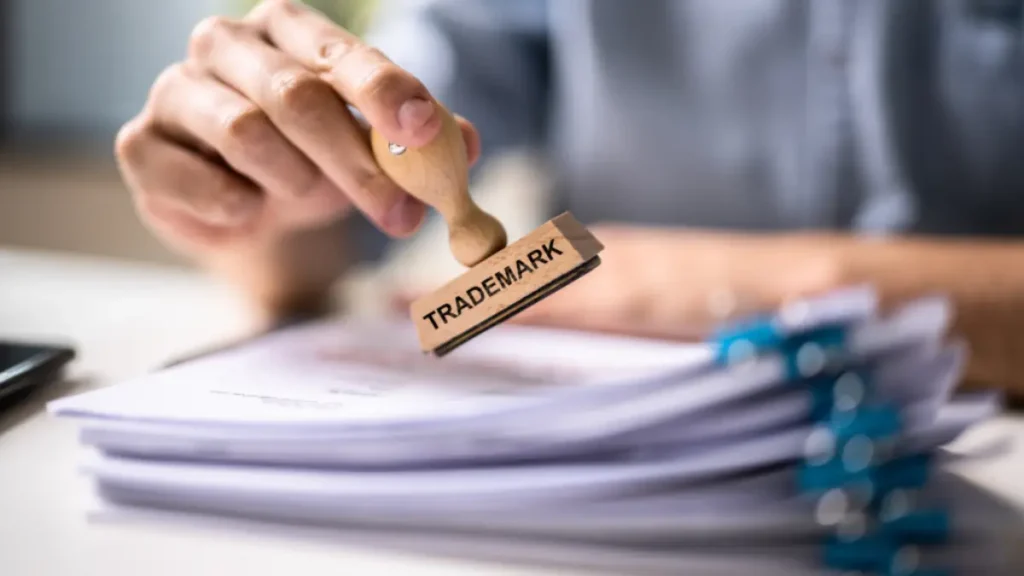
Questionable Attorneys Listed on Filings
Our investigation revealed trademark filings naming the following individuals as attorneys, often using Maria Zafar’s email as the primary contact:
- Waqas Ahmad: Listed with the address 492 Wood Ridge Ave, NJ, which is actually a residential property and not associated with any legal practice.
- Caitlin Jean Campbell: Address listed as 411 W 4th St, Santa Ana, CA, a federal courthouse that has no connection to an attorney’s office.
- Victoria Velazquez Walker: A legitimate attorney whose name has been tied to filings with unrelated addresses and suspicious emails, raising serious questions about the integrity of these applications.
These findings underscore a troubling pattern of misrepresentation, further complicating the legal risks for FBABB clients.
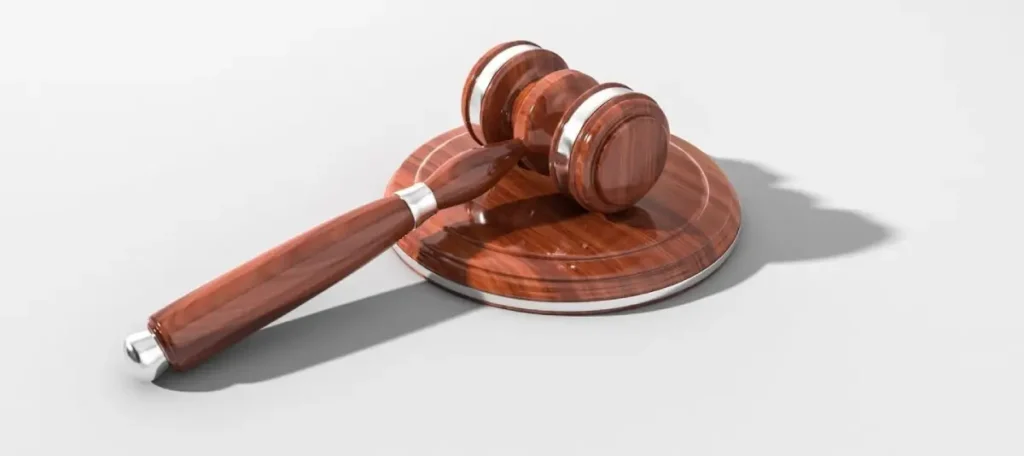
Oh, Hello Zab Twins!
This trademark application was submitted by Maria Zafar on behalf of "The Zab Twins," using the email address linked to their business, "[email protected]."
This raises an important question: Could Darren Campbell have initially sourced Maria through his connections with the Zab Twins, Darren's mentors?
Maria’s involvement in their filings suggests a deeper relationship, sparking speculation that Darren may have adopted these questionable tactics through his association with his Canadian counterparts. Could the alleged fraud and misuse of names be part of a broader pattern (yes, there's more) rooted in these affiliations?
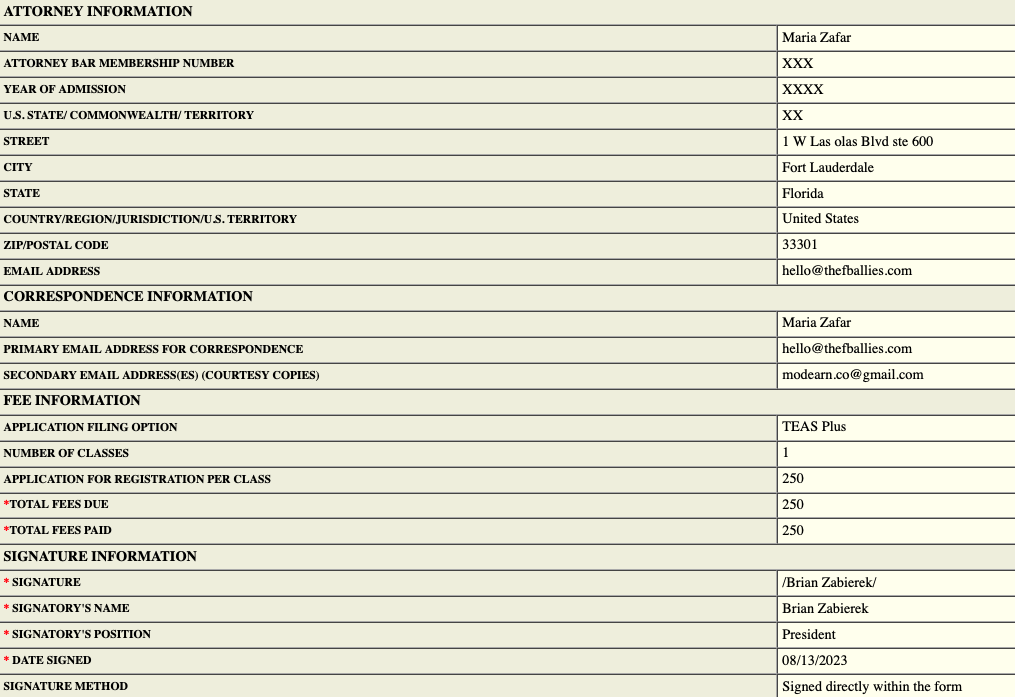
Are You A Client? Here's What You Need To Do Now
The FBABB team’s dismissive attitude and decision to sign off for the holidays ignore the serious consequences of these fraudulent filings. This is not about “outside noise” or waiting for a “clear path forward”—it’s about safeguarding your business, your livelihood, and your future.
We strongly urge every client to take action now:
- Verify Your Filing: Use the USPTO’s TSDR system to check your application for irregularities.
- Report Irregularities: Contact [email protected] with details of your case and any supporting documentation.
- Seek Professional Guidance: Consult a legitimate, licensed attorney to help you navigate the next steps.
Do not wait for FBABB’s promised January updates.
An open investigation is underway into "Maria," who is no longer able to submit trademark applications on behalf of FBABB clients. So, ask yourself: who do you trust more with your business—Jason’s reassurances or the USPTO, the authority responsible for managing trademark applications?
If you have additional information or need support, please reach out.

